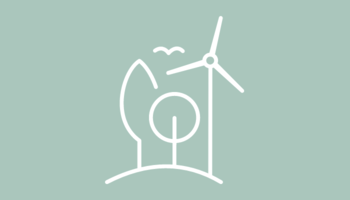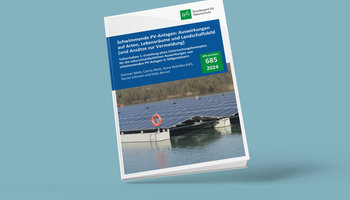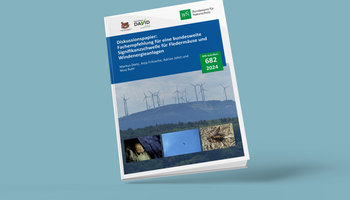While the danger to bats from large wind turbines has now been proved, there is still uncertainty about the effects of small wind turbines (SWT). Based on a before-and-after comparison, bat behaviour at six sites in Southern Germany will be documented over the first few days of operation using a 3D infrared camera, a real time thermal imaging camera and acoustic recordings.
The preceding project "Taking account of species' protection interests when constructing small wind turbines" (FKZ 3515 83 0200) recorded baseline data on the effects of small wind turbines on a larger scale for the first time. However, the findings are difficult to generalise as the study was carried out at existing SWTs and only in Schleswig-Holstein. The collision risk at sites with higher bat activity and different species composition might be higher, particularly directly after setting up the SWT. The follow-up project in Southern Germany takes this issue further. Based on a before-and-after study, bat behaviour at six sites will be documented over the first few days of operation using a 3D infrared camera, a real time thermal imaging camera and acoustic recordings. In order to avoid harming the bats, the turbines will be fitted with nets to intercept the bats and immediately turned off if there is any sign of an increased risk. The turbines will only be operated during the field study in the constant presence of a minimum of two members of staff.
The aim is to find out whether and under what conditions bats could collide with SWTs. This project aims not only to achieve a geographical extension of the original project, but also to make a more precise assessment of potential threats to bats from a small wind turbine. By selecting a total of six sites for the observations over a period of up to five days each, information can be collected for different species. The results will contribute to an improved understanding of the possible threats to bats from SWTs. They will provide sound baseline data for a proper assessment of the hazards for the planning and approval process.
The results demonstrate that, despite the generally strong ability of bats to evade moving rotor blades, bat casualties at SWTs placed at sites of high bat activity can reach or exceed the current threshold levels set for large wind turbines. As SWTs provide less energy than large turbines, their negative impact on bats should be minimized by avoidance measures such as a bat-friendly site selection or curtailment algorithms.
Freiburger Institut für Angewandte Tierökologie (FRINAT)
Dunantstr. 9, 79110 Freiburg
Dr. Stefanie Hartmann,
Tel.: +49 761 2852 2391
hartmann(at)frinat.de
Dr. Robert Brinkmann
Tel.: +49 761 2089 9960
brinkmann(at)frinat.de
Private Universität für Gesundheitswissenschaften, Medizinische Informatik und Technik GmbH (UMIT)
Institut für Mess- und Sensortechnik
Dipl.-Ing. Klaus Hochradel
Eduard Wallnöfer-Zentrum 1
A-6060 Hall in Tirol, Austria
Federal Agency for Nature Conservation (BfN)
FG II 4.3 Nature conservation and renewable energies
Alte Messe 6, 04103 Leipzig
Asja Weber
Tel.: +49 3 41/ 309 77 48
WeberA(at)BfN.de
03.04.2024
Weiter

03.04.2024
Weiter

19.03.2024
Weiter
